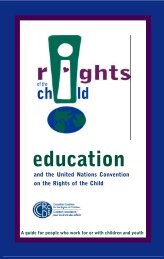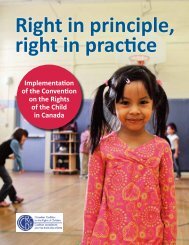Poste - Canadian Coalition for the Rights of Children
Poste - Canadian Coalition for the Rights of Children
Poste - Canadian Coalition for the Rights of Children
Create successful ePaper yourself
Turn your PDF publications into a flip-book with our unique Google optimized e-Paper software.
(c) freedom <strong>of</strong> peaceful assembly; and<br />
(d) freedom <strong>of</strong> association.<br />
C A N A D I A N C O A L I T I O N F O R T H E R I G H T S O F C H I L D R E N<br />
The fundamental freedoms recognized in <strong>the</strong> Charter<br />
are not absolute. Article 1 <strong>of</strong> <strong>the</strong> Charter states that <strong>the</strong><br />
rights and freedoms are “subject only to such<br />
reasonable limits prescribed by law as can be<br />
demonstrably justified in a free and democratic<br />
society.” Convention articles 13, 14 and 15 may be<br />
subject to certain restrictions but <strong>the</strong>se restrictions<br />
must be prescribed by law and necessary to protect<br />
public safety, order, health or morals, or <strong>the</strong><br />
fundamental rights and freedoms <strong>of</strong> o<strong>the</strong>rs. The<br />
Convention allows no limitation on freedom <strong>of</strong> thought<br />
and conscience.<br />
The Charter does not explicitly recognize <strong>the</strong>se rights<br />
<strong>for</strong> children. The UN Committee on <strong>the</strong> <strong>Rights</strong> <strong>of</strong> <strong>the</strong><br />
Child has stated, however, that “it is not enough that<br />
<strong>the</strong>se principles be reflected in constitutions as<br />
applying to “everyone” but should specifically<br />
recognize <strong>the</strong> rights <strong>of</strong> children.” 13<br />
30<br />
Canada and every province and territory have human<br />
rights legislation that generally prohibits discrimination<br />
based on race, colour, place <strong>of</strong> origin, family status,<br />
religion, political belief, physical or mental disability,<br />
gender, and sexual orientation. The <strong>Canadian</strong> Human<br />
<strong>Rights</strong> Act does not mention <strong>the</strong> three fundamental<br />
freedoms. 22 A review <strong>of</strong> provincial and territorial human<br />
rights legislation found that <strong>the</strong> Yukon, 23 Saskatchewan 24<br />
and Quebec 25 are <strong>the</strong> only jurisdictions that provide<br />
specific protection <strong>of</strong> <strong>the</strong> fundamental freedoms. While<br />
children are included in <strong>the</strong>se protections, <strong>the</strong>y are not<br />
explicitly mentioned.<br />
The Yukon Human <strong>Rights</strong> Act states that every individual<br />
has <strong>the</strong> right to enjoy fundamental freedoms in<br />
accordance with <strong>the</strong> law. The Quebec Charter <strong>of</strong> Human<br />
<strong>Rights</strong> and Freedoms (article 9.1) states that every person<br />
shall maintain proper regard <strong>for</strong> democratic values,<br />
public order and <strong>the</strong> general well-being <strong>of</strong> <strong>the</strong> citizens<br />
<strong>of</strong> Quebec in exercising <strong>the</strong>ir fundamental rights and<br />
freedoms. It makes clear, however, that <strong>the</strong> scope <strong>of</strong> <strong>the</strong><br />
Federal, provincial, territorial and municipal legislation can place limits on fundamental freedoms. Some examples<br />
follow.<br />
• Sections 318 and 319 <strong>of</strong> <strong>the</strong> Criminal Code 14<br />
prevent <strong>the</strong> publication <strong>of</strong> statements that advocate genocide or wilfully promote hatred against an identifiable<br />
group. The constitutionality <strong>of</strong> section 319 was upheld by <strong>the</strong> Supreme Court in R. v. Keegstra. 15<br />
• Section 163 <strong>of</strong> <strong>the</strong> Criminal Code 16 restricts <strong>the</strong><br />
publication and circulation or possession <strong>of</strong> obscene material. A publication is considered obscene if it has as its<br />
dominant characteristic <strong>the</strong> undue exploitation <strong>of</strong> sex or sex in combination with crime, violence, cruelty and<br />
horror. 17<br />
• Section 13 <strong>of</strong> <strong>the</strong> <strong>Canadian</strong> Human <strong>Rights</strong> Act<br />
prohibits communication by telephone <strong>of</strong> any matter likely to expose persons to hatred or contempt on <strong>the</strong> basis <strong>of</strong><br />
a prohibited ground <strong>of</strong> discrimination. 18<br />
• Most human rights laws in Canada prohibit notices,<br />
signs and symbols that convey an intention to discriminate. 19<br />
• In Irwin Toy v. Quebec, 20 legislation prohibiting<br />
advertising aimed at children under <strong>the</strong> age <strong>of</strong> 13 was upheld by <strong>the</strong> Supreme Court <strong>of</strong> Canada. The court<br />
concluded that <strong>the</strong> provision violates section 2(b) <strong>of</strong> <strong>the</strong> Charter but that it is a reasonable limit, which protects a<br />
vulnerable group.<br />
• As an example <strong>of</strong> municipal limits, a Nepean,<br />
Ontario city by-law bans swearing, spitting and o<strong>the</strong>r disruptive behaviour at city parks and community centres. 21




